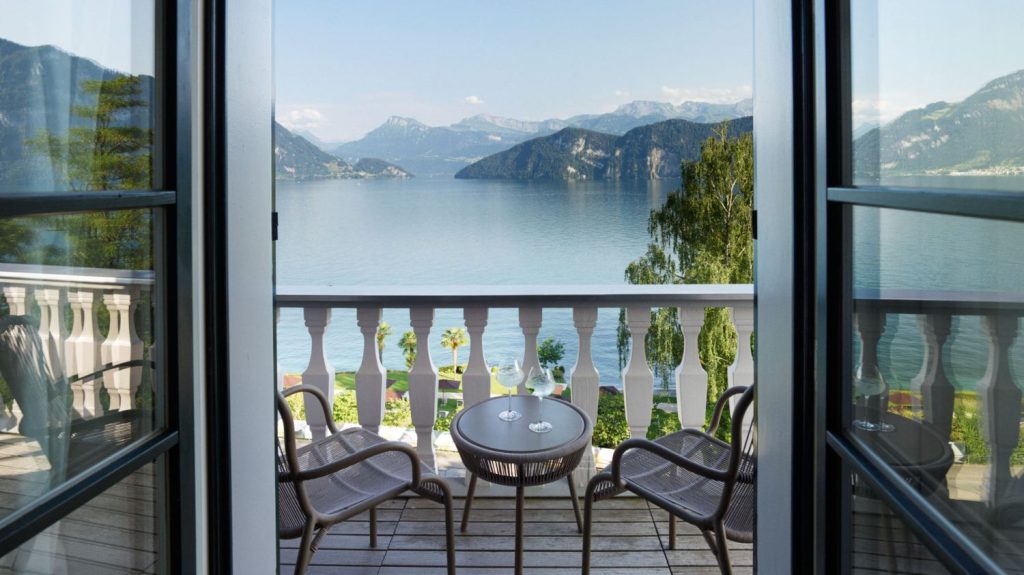
A spa has launched a new science-based sleep reset. Insomniac Anna Pasternak was a willing (and very tired) guinea pig
My healthy sleep habit — typically nine solid hours — is essential to my wellbeing. But recently, while finishing writing a book, I got into the pattern of waking at 2am, my head whirring with sentences that then escalated into full-on worry-bead anxiety. I’d eventually fall back to sleep and wake tired, only to drag myself through the day. For a month I felt ragged and depleted.
I tormented myself envisaging the physical, neurological and emotional disorders that my busted circadian rhythm could cause. Only recently I was reading in a New York Times article about how more extreme sleep deprivation can lead to feelings of depression, loneliness and isolation. Even worse, an increased risk of dementia, heart attacks … the list is endless.
When I heard that the pioneering Swiss health resort Chenot Palace Weggis was launching a new sleep cycles module as an add-on to its Recover and Energise programme I felt huge relief. A long-term fan of the Chenot Method, I find its blend of diagnostics, detox diet, energetic rebalancing and de-stressing based on Chinese medicine, combined with cutting-edge science, unbeatable. I was even more encouraged that its sleep programme didn’t involve being hooked up to monitors. I tried this at an Italian clinic once and was freaked out to discover that I had sat bolt upright for an hour during the night.
Arriving at Chenot Palace, on the shore of Lake Lucerne, is panacea in itself. From my pared-down room — one of the four special sleep suites — looking at the shifting palette of light on the water instantly soothed. These clever suites have been designed like a recording studio, so they remove any noises unhelpful to slumber. Noise doesn’t bounce off the walls, so rooms have a calm, contained feel. The joy of not hearing banging doors in the corridor was ecstasy alone. As for the nanobionic bed linen? Wow, I am sold. When they told me that this FDA-approved, scientific bed linen has molecules that absorb the body’s heat and reflect it back to your body as infrared energy, I was sceptical. But for the menopausal midlifer, it was astonishing. I never overheated in the night, noticing the difference as soon as I got home.
On your first day, you undergo a battery of tests, which include ascertaining body mass, bone density, fat deposits, collagen levels in your skin, heart function and your stress response. Although my physique was healthy, my system craved less stress and more rest.
To relax the nervous system, attention at Chenot is paid to increasing sleep pressure (which causes you to feel sleepy) by building up the neurotransmitter adenosine. The more adenosine we build during daylight — through relaxation, being outside and exercise — the better and longer we sleep at night. Sleep pressure accumulation is also amplified through whole body photobiomodulation (also known as low-level laser therapy, or LLLT) — every afternoon I lay naked under what looked like a 1970s sun lamp which, fortunately, wasn’t going to baste or bronze me but would apply specific lightwaves to my cells. My favourite daily treatment involved lying in a darkened room with headphones on listening to neuroacoustic music. Pioneered by the American company NuCalm, it is designed to synchronise with the body’s parasympathetic nervous system, guiding the brain into relaxing alpha and theta waves, which promote deep relaxation and calm (beta waves, on the other hand, are associated with our active states and linked with higher anxiety).
The “five elements” Chinese medicine on which the daily massages are based stimulate the body’s meridians, defined as “strings connecting acupuncture points, considered as passageways through which energy flows throughout the body”, while also boosting the parasympathetic nervous system. Everything at Chenot is angled to give the body time to recover from the pounding it takes in our daily lives. Three sessions of whole body cryotherapy at -110C, which involved entering a giant freezer-like structure for three minutes, also helped to calm my wired adrenal system. Immediately afterwards I felt energised, with the fatigue only kicking in later. The daily Chenot Diet — 850 calories of exquisite but mouse-like portions of vegan food — is a fast-mimicking one, triggering the metabolic process autophagy. This reduces inflammation, strengthens the immune system and restores biorhythm, all of which aid the body’s recuperation. Regularly hysterical with hunger, I eventually adapted.
On the fifth night, the miracle occurred — I slept through the entire night. Not only that, but I have not woken up in early-hour agitation since. When I got home, I downloaded the NuCalm app, and every afternoon I am religiously dedicating 30 minutes to lie down and listen to the (appropriately named) Rescue Journey. This helps to temper the body’s stress response, inhibiting the production of cortisol. My sleep is deeper as a result of listening to NuCalm. Thanks to the sophistication and science I experienced at Weggis, I now understand that good sleep doesn’t begin when you hit the sheets. We need to consider our nervous system throughout the day.
Dr George Gaitanos, scientific officer of the Chenot Group, reminded me that “sleep is the foundation of health. Diet, exercise, anti-stress are the pillars. You can not have optimum health without optimum sleep.”